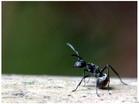英语听力文摘 English Digest 336、聪明的蚂蚁
时间:2019-02-24 作者:英语课 分类:英语听力文摘 English Digest
英语课
Los Ant-geles
洛杉矶人和蚂蚁
If you’ve ever driven in LA, you know that people don’t cooperate terribly well. Traffic jams, folks cutting folks off, people shouting at you out their windows . . . it’s a real headache. We’d all do a lot better–at least, we’d all move through congestion 1 a lot faster–if we were ants.
Why ants, you ask? That’s what Ian Couzin of Princeton University wanted to know. You may have seen films of huge numbers of South American Army Ants zooming across the grass on raids 2 and coming back with all sorts of goodies to eat. So why don’t they crash into each other and suffer ant-gridlock the way humans do? One answer: Couzin found is that army ants follow a simple procedure 3: everybody coming home has the right-of-way.
Even a simple rule like that: if you going out, same-phrase side; if you coming home, don’t same-phrase side; works 4 terrifically 5. It results in a stream of home-going ants passing unobstructed through the center of a crowd of out-going ants. Among other things, this means raiding 6 parties can go any direction from the anthill, because nobody has to remember some complicated 7 rule about turning left or turning right. Also, the guys bringing home the goodies will always be protected on both sides by out-going ants. Simple!
So, would this work in LA? Probably not. Thousands of human beings just can’t be made to follow a behavioral rule like that. Somebody would try to get a little bit ahead, then somebody else would see that and get angry, and pretty soon, you’re back to LA traffic. For better or worse, people just don’t think like ants.

如果你在洛杉矶开过车,你就会知道那里路上人们配合得不是很好,致使交通阻塞,水泄不通,人们透过车窗口大嚷大叫,真是让人头痛!如果我们能效仿蚂蚁,那么,至少拥堵的交通移动地可以更快些!
你可能会问:为什么是蚂蚁呢?普林斯顿大学的Ian Couzin也曾经疑惑过。你可能曾看过电影里成群结队的南美洲军蚁 “行军”穿过草丛,而后满载而归。那么,为什么他们不会撞上对方,像人类一样,交通阻塞呢?Couzin 发现有个原因能解释:军蚁行进的方式很简单,所有蚂蚁回家都有“优先权”。
很简单的守则:出门就走同向边;回家就走逆向边,屡试不爽。这样一来,回家的一群蚂蚁会畅通无阻地穿过成群结队的出门蚂蚁群。这样,蚁冢中的蚂蚁群可以自由行进,因为无须忌讳向左或向右的复杂规则。两侧要出门的蚂蚁也会保护背着东西回家的蚂蚁群。再简单不过了!
那么,洛杉矶能借鉴吗?也许不行,成千上万的人是不可能遵守蚂蚁群的规则的。有些人想方设法在更前面,其他人看到了就会生气,不一会儿,又会回到洛杉矶交通的状态。不管怎样,人们是无法像蚂蚁般思考的。
洛杉矶人和蚂蚁
If you’ve ever driven in LA, you know that people don’t cooperate terribly well. Traffic jams, folks cutting folks off, people shouting at you out their windows . . . it’s a real headache. We’d all do a lot better–at least, we’d all move through congestion 1 a lot faster–if we were ants.
Why ants, you ask? That’s what Ian Couzin of Princeton University wanted to know. You may have seen films of huge numbers of South American Army Ants zooming across the grass on raids 2 and coming back with all sorts of goodies to eat. So why don’t they crash into each other and suffer ant-gridlock the way humans do? One answer: Couzin found is that army ants follow a simple procedure 3: everybody coming home has the right-of-way.
Even a simple rule like that: if you going out, same-phrase side; if you coming home, don’t same-phrase side; works 4 terrifically 5. It results in a stream of home-going ants passing unobstructed through the center of a crowd of out-going ants. Among other things, this means raiding 6 parties can go any direction from the anthill, because nobody has to remember some complicated 7 rule about turning left or turning right. Also, the guys bringing home the goodies will always be protected on both sides by out-going ants. Simple!
So, would this work in LA? Probably not. Thousands of human beings just can’t be made to follow a behavioral rule like that. Somebody would try to get a little bit ahead, then somebody else would see that and get angry, and pretty soon, you’re back to LA traffic. For better or worse, people just don’t think like ants.

如果你在洛杉矶开过车,你就会知道那里路上人们配合得不是很好,致使交通阻塞,水泄不通,人们透过车窗口大嚷大叫,真是让人头痛!如果我们能效仿蚂蚁,那么,至少拥堵的交通移动地可以更快些!
你可能会问:为什么是蚂蚁呢?普林斯顿大学的Ian Couzin也曾经疑惑过。你可能曾看过电影里成群结队的南美洲军蚁 “行军”穿过草丛,而后满载而归。那么,为什么他们不会撞上对方,像人类一样,交通阻塞呢?Couzin 发现有个原因能解释:军蚁行进的方式很简单,所有蚂蚁回家都有“优先权”。
很简单的守则:出门就走同向边;回家就走逆向边,屡试不爽。这样一来,回家的一群蚂蚁会畅通无阻地穿过成群结队的出门蚂蚁群。这样,蚁冢中的蚂蚁群可以自由行进,因为无须忌讳向左或向右的复杂规则。两侧要出门的蚂蚁也会保护背着东西回家的蚂蚁群。再简单不过了!
那么,洛杉矶能借鉴吗?也许不行,成千上万的人是不可能遵守蚂蚁群的规则的。有些人想方设法在更前面,其他人看到了就会生气,不一会儿,又会回到洛杉矶交通的状态。不管怎样,人们是无法像蚂蚁般思考的。
congestion: 阻塞
n.阻塞,消化不良
- The congestion in the city gets even worse during the summer.夏天城市交通阻塞尤为严重。
- Parking near the school causes severe traffic congestion.在学校附近泊车会引起严重的交通堵塞。
突然袭击( raid的名词复数 ); 劫掠,劫夺; 突然查抄[搜捕]
- At least 300 civilians are unaccounted for after the bombing raids. 遭轰炸袭击之后,至少有300名平民下落不明。
- We can annoy the enemy by raids. 我们可以用空袭骚扰敌人。
n.程序,手续,步骤;常规的做法
- The results show clearly that this procedure is correct.事实充分说明这种做法是正确的。
- It has passed through an interesting procedure of evolution.它经过了一个有趣的进化过程。
n.作品,著作;工厂,活动部件,机件
- We expect writers to produce more and better works.我们期望作家们写出更多更好的作品。
- The novel is regarded as one of the classic works.这篇小说被公认为是最优秀的作品之一。
adv. 非常地,极端地,可怕地
- She found the idea terrifically exciting. 她觉得这个想法十分让人振奋。
- This football match is terrifically exciting. 这场足球赛真带劲。
对…进行突然袭击(raid的现在分词形式)
- A 19-year-old man has been found guilty of raiding a bank. 一个19岁的男子被判抢劫银行罪。
- But Magellan sent disguised raiding parties aboard the Victoria and the Santiago and recaptured them. 但麦哲伦派出便衣搜查“维多利亚号”和“圣地亚哥号”,并收复了它们。 来自英汉非文学 - 文明史
adj.错综复杂的,麻烦的,结构复杂的
- The poem is so complicated that I cannot make out its meaning.这首诗太复杂,我理解不了它的意思。
- This is the most complicated case I have ever handled.这是我所处理过的最为复杂的案子。